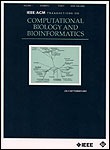
IEEE-ACM Transactions on Computational Biology and Bioinformatics
metrics 2024
Exploring the Intersection of Data and Life Sciences
Introduction
IEEE-ACM Transactions on Computational Biology and Bioinformatics is a prestigious journal published by the IEEE Computer Society, focusing on the interdisciplinary field of computational biology and bioinformatics. Established in 2004, this journal has made significant strides in contributing to our understanding of complex biological systems through quantitative methods and computational techniques, and it spans a converged publication period through 2024. As a notable resource with an impact factor that positions it in the second quartile in the domains of Applied Mathematics, Biotechnology, and Genetics, it serves as an essential platform for researchers and professionals seeking to disseminate their findings to a global audience. The journal ranks impressively in Scopus, with Applied Mathematics holding a rank of #38 out of 635 (94th percentile) and Genetics at #86 out of 347 (75th percentile), highlighting its significant influence in the scientific community. While the journal is not open-access, it provides valuable insights and cutting-edge research that are crucial for advancing the fields of bioinformatics and computational biology, making it indispensable for students, researchers, and practitioners alike.
Metrics 2024
 0.79
0.79 3.60
3.60 3.20
3.20 89
89Metrics History
Rank 2024
Scopus
IF (Web Of Science)
JCI (Web Of Science)
Quartile History
Similar Journals

Current Bioinformatics
Innovating Computational Techniques for Biological InsightsCurrent Bioinformatics, an esteemed journal published by Bentham Science Publishers Ltd, serves as a pivotal platform for the dissemination of cutting-edge research in the fields of bioinformatics, biochemistry, computational mathematics, genetics, and molecular biology. With an ISSN of 1574-8936 and an E-ISSN of 2212-392X, this journal has established itself as a vital resource for researchers, professionals, and students keen on exploring interdisciplinary approaches to biological data analysis. Its prominence is reflected in its quartile rankings for 2023, where it stands in Q3 for biochemistry and computational mathematics, alongside Q4 rankings in genetics and molecular biology. Current Bioinformatics, located in the United Arab Emirates and converging from 2007 to 2024, aims to foster innovation in the field by presenting original research articles, reviews, and case studies that drive forward our understanding of complex biological systems through computational techniques. This journal is an integral resource for those wishing to stay at the forefront of bioinformatics research and applications.

Biocybernetics and Biomedical Engineering
Advancing the Frontiers of Biomedical InnovationBiocybernetics and Biomedical Engineering, published by ELSEVIER in the Netherlands, is a prestigious journal that stands at the forefront of the intersecting fields of biomedical engineering and artificial intelligence. With an impressive Impact Factor that places it in the Q1 category for Biomedical Engineering, this journal not only ranks 17th out of 303 in Scopus but also boasts a remarkable percentile ranking of 94th, highlighting its influence and relevance within the scientific community. Since its inception in 2008, Biocybernetics and Biomedical Engineering has aimed to publish cutting-edge research that integrates principles of cybernetics with technological advancements in health care, thereby fostering innovations that improve patient outcomes. Dedicated to advancing knowledge in biomedical technology, the journal serves as a vital resource for researchers, professionals, and students seeking to explore the latest developments and methodologies in the field.

Interdisciplinary Sciences-Computational Life Sciences
Innovating Research at the Crossroads of Biology and TechnologyInterdisciplinary Sciences-Computational Life Sciences, published by SPRINGER HEIDELBERG, is a premier journal dedicated to advancing the field of life sciences through the lens of computational methods. With an ISSN of 1913-2751 and an E-ISSN of 1867-1462, this journal serves as a significant platform for researchers and professionals alike, fostering innovation and collaboration across various disciplines. As a testament to its impact, the journal holds a Q2 category status in Biochemistry, Genetics and Molecular Biology, Computer Science Applications, and Health Informatics, reflecting its influential contributions and rigorous peer-review process. The Scopus rankings demonstrate its esteemed placement within its fields, with notable percentiles that highlight its relevance and reach. While the journal operates under a traditional access model, its commitment to publishing high-quality research continues to stimulate important discussions and developments within the scientific community. Founded in 2009 and converging through 2024, Interdisciplinary Sciences-Computational Life Sciences remains an essential resource for the latest discoveries at the intersection of computation and life sciences, appealing to both seasoned researchers and enthusiastic students eager to contribute to this dynamic field.
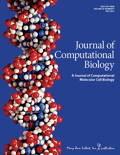
JOURNAL OF COMPUTATIONAL BIOLOGY
Unveiling the Complexities of Life through Computational InnovationJOURNAL OF COMPUTATIONAL BIOLOGY, published by Mary Ann Liebert, Inc., serves as a premier platform for the dissemination of groundbreaking research at the intersection of biological sciences and computational methods. Established in 1994, this journal provides a valuable resource for researchers, professionals, and students interested in the evolving fields of computational mathematics and biology. With a commendable Q2 ranking in several pertinent categories such as Computational Mathematics and Modeling and Simulation, it emphasizes high-quality studies that propel understanding and innovation in these areas. Although the journal currently operates under traditional access options, it plays a crucial role in fostering scholarly communication and collaboration among a diverse audience, advancing knowledge in genetics, molecular biology, and beyond. The journal's continual evolution, with a commitment to publish until at least 2024, positions it as a critical resource in the fast-paced world of computational biology.

PLoS Computational Biology
Advancing the Frontier of Biological DiscoveryPLoS Computational Biology is a premier open-access journal published by the Public Library of Science, committed to advancing the understanding of complex biological data through computational approaches. Since its inception in 2005, the journal has made significant strides in the fields of Cellular and Molecular Neuroscience, Computational Theory and Mathematics, Ecology, Genetics, and Molecular Biology, achieving a notable Q1 ranking in various categories as of 2023. With an exceptional impact factor and an esteemed ranking—such as Rank #23/176 in Computational Theory and Mathematics—PLoS Computational Biology provides a vital platform for researchers, professionals, and students to disseminate their cutting-edge findings and insights. The journal's open-access model ensures that high-quality research is freely accessible worldwide, fostering collaboration and innovation across disciplines. Located in San Francisco, CA, it serves as a hub for the global scientific community, making it an indispensable resource for anyone at the forefront of computational biology and its diverse applications.

Algorithms for Molecular Biology
Empowering researchers with open access to transformative methodologies.Algorithms for Molecular Biology, published by BMC, is a premier Open Access journal dedicated to advancing the field of molecular biology through innovative computational methods. Since its inception in 2006, the journal has provided a vital platform for researchers to share their findings and methodologies, covering a diverse range of topics at the intersection of applied mathematics, computational theory, and molecular biology. With a notable impact factor reflected in its Scopus ranks, including a Q2 classification in both applied mathematics and computational theory, as well as Q3 in molecular and structural biology, the journal plays an essential role in this rapidly evolving discipline. The wide accessibility of articles published under the Open Access model ensures that research findings reach a global audience, fostering collaboration and innovation amongst scientists and professionals alike. As we look towards converging years from 2006 to 2024, Algorithms for Molecular Biology continues to uphold the highest standards of scientific integrity and excellence, reinforcing its status as a key resource for those engaged in the profound complexities of molecular biology.
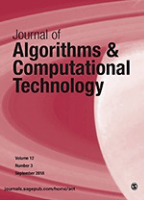
Journal of Algorithms & Computational Technology
Connecting Scholars to the Future of Computational InnovationJournal of Algorithms & Computational Technology, published by SAGE PUBLICATIONS LTD, serves as a noteworthy platform for scholars and practitioners in the realms of applied mathematics, computational mathematics, and numerical analysis. With an ISSN of 1748-3018 and an E-ISSN of 1748-3026, this Open Access journal has been disseminating high-quality research since 2007, ensuring that significant advancements in algorithmic techniques and computational methodologies are readily accessible to the global academic community. Based in the United Kingdom, this journal has steadily established itself within specialized quartiles, notably achieving Q3 ranking in Computational Mathematics and Q4 in both Applied Mathematics and Numerical Analysis for 2023, reflecting its growing influence in these fields. As the journal converges from 2011 to 2024, it aims to cater to the needs of researchers, professionals, and students by publishing innovative research that not only addresses theoretical frameworks but also provides practical applications. By leveraging its open-access model, the Journal of Algorithms & Computational Technology fosters a collaborative environment where knowledge can flourish, allowing for the continuous evolution of algorithms that drive technological advancement.
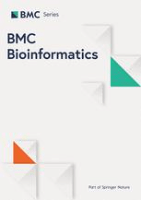
BMC BIOINFORMATICS
Advancing the Frontier of Biological Discovery through Computation.BMC Bioinformatics is a leading open-access journal published by BMC, dedicated to the rapidly evolving field of bioinformatics. With its inception in 2000, the journal has established itself as an essential resource for researchers, professionals, and students alike, disseminating high-quality research that bridges the gap between biology and computational science. BMC Bioinformatics holds a reputable Q1 ranking in Applied Mathematics and Computer Science Applications, and a Q2 ranking in both Biochemistry and Structural Biology, reflecting its significant impact in these interdisciplinary fields. The journal's broad scope encompasses innovative methodologies, tools, and applications that drive progress in biological research through computational approaches. With open access since its inception, the journal ensures unrestricted availability of cutting-edge research findings, promoting knowledge sharing and collaboration in the global scientific community. As it continues to publish advancements up to 2024, BMC Bioinformatics remains a cornerstone for those seeking to enhance their understanding of bioinformatics and its vital role in modern science.
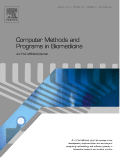
Computer Methods and Programs in Biomedicine
Unleashing the Power of Computing in Biomedical Discoveries.Computer Methods and Programs in Biomedicine, published by ELSEVIER IRELAND LTD, is a leading journal at the intersection of computer science and biomedical research. With an impressive impact factor evidenced by its Q1 rankings in multiple categories—Computer Science Applications, Health Informatics, and Software—this journal ranks highly among peer publications, showcasing its significance in advancing interdisciplinary research. Covering a wide array of topics since its inception in 1985, it is particularly crucial for those invested in the innovation of computational methods applied to the biomedical field. The journal has established a strong reputation, with Scopus rankings placing it in the top percentiles across its relevant sectors, including the 14th position out of 138 in Health Informatics. Researchers, practitioners, and students looking to explore current trends, methodologies, and advancements in biomedical applications of computer science will find this journal an invaluable resource.
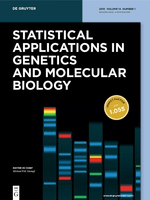
Statistical Applications in Genetics and Molecular Biology
Elevating Research Standards in Genetics and Molecular BiologyStatistical Applications in Genetics and Molecular Biology, published by WALTER DE GRUYTER GMBH, serves as a vital academic platform for researchers and professionals dedicated to the integration of statistical methodologies within the fields of genetics and molecular biology. Established in Germany, this interdisciplinary journal, with an ISSN of 2194-6302 and E-ISSN 1544-6115, seeks to bridge the gap between statistical theory and biological applications, making it an essential reading for those engaged in data analysis, biological research, and computational methods. Despite its current Q4 ranking in key categories such as Computational Mathematics and Genetics, the journal continues to strive for academic rigor and relevance, addressing contemporary challenges and advancements in the field. The journal encourages the submission of high-quality, peer-reviewed research that showcases innovative statistical approaches to genetic and molecular data, providing valuable insights and fostering collaboration among scientists. Exploratory or applied studies that demonstrate effective statistical applications are particularly welcomed, ensuring that both novel and established methodologies are discussed, alongside practical case studies that advance the understanding of biological phenomena. As an open-access journal, it aims to widen the accessibility of cutting-edge research, emphasizing the importance of transparency and sharing knowledge among the scientific community.